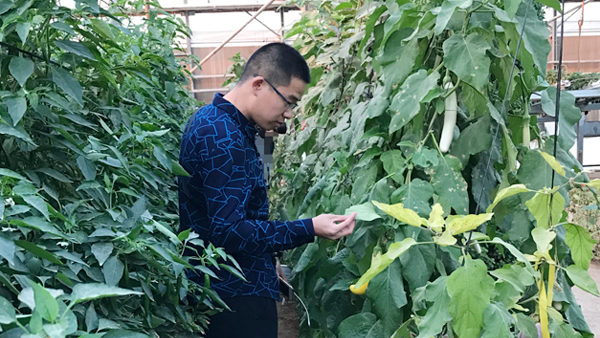Microbial agents contain specific living microorganisms, which can promote the absorption of plant nutrient elements through their life activities, and some can release growth and inhibit the formation of harmful microorganisms. today,Tu chefTell us about the main functions of microbial agents.

Li Nongqiang, founder of local chef, is in Israel.2Investigation of Migao Pepper Eggplant Garden
1Improve soil fertility: Some microbial agents can increase the content of nitrogen, phosphorus and potassium nutrients in the soil; It can also improve the activity of some soil enzymes, which is beneficial to the transformation of nutrients in the soil and the absorption and utilization of plants. In addition, with the help of microbial agents, a large amount of carbon dioxide will be produced, which can improve the ability of soil water and fertilizer conservation.
2Promote the release of insoluble mineral nutrients: biological microbial agents improve the activity of soil enzymes, and dissolve insoluble soil nutrients, which is beneficial to plant absorption. At the same time, it also secretes some organic acid substances, which can decompose organic matter, and the sugar produced is conducive to the growth of nitrogen fixation.
3Help crops absorb nutrients: For example, rhizobia can stimulate the roots of legumes to form nodules, which can transform nitrogen in the soil into nitrogen fertilizer that crops can absorb.
4Enhance plant disease (insect) resistance: microorganisms in biological microbial agents can secrete pesticides and plant growth in the soil. Insecticides can kill the eggs of plant diseases and pests, promote the growth of plants, increase the chlorophyll content and improve the photosynthesis ability of plants. In addition, it can also promote plants to produce a large number ofPOD、SOD、CATEnzymes, etc., to maintain the stability of cell membrane and improve plant defense ability.
5Enhance the stress resistance of plants: Some organismsMicrobial inoculumAfter application, it grows and multiplies in the soil in large quantities, and gathers in the roots of crops to form dominant flora, which improves the surrounding environment and the stress resistance of plants during its own growth process.
6Improve crop quality: Bacillus laterosporus, Bacillus subtilis and Bacillus coagulans in flora can reduce nitrate content in plants.20%Above, can reduce the heavy metal content, can make the fruitVcContent increase30%Above, soluble sugar is increased.2~4Degree. Lactic acid bacteria, Lactobacillus acidophilus, Bacillus coagulans and Bacillus subtilis can improve essential amino acids (lysine and methionine) and vitamins in fruits.BAnd unsaturated fatty acids, etc. The fruit tastes good, is storable and sells at a high price.
7Regulation of crop growth: microorganisms in microbial inoculum can release auxin, indoleacetic acid, gibberellin, etc. in the soil, which can regulate crop growth, and further improve yield.
Shandong Tudachu Fertilizer Co., Ltd. is a high-tech enterprise introduced by the government, which integrates the research and development, production, sales, foreign technology introduction and import agency of microbial agents, water-soluble fertilizers and fully water-soluble tower compound fertilizers. It is supported by a full set of functional fertilizer products, scientifically nourishes every cycle of crop growth, and provides a variety of high-tech products. According to the different conditions of different crops, nutrition cares for every link of crop growth, effectively solves the problem of crop nutrient deficiency, and enables crops to grow healthily and obtain higher quality and more output.